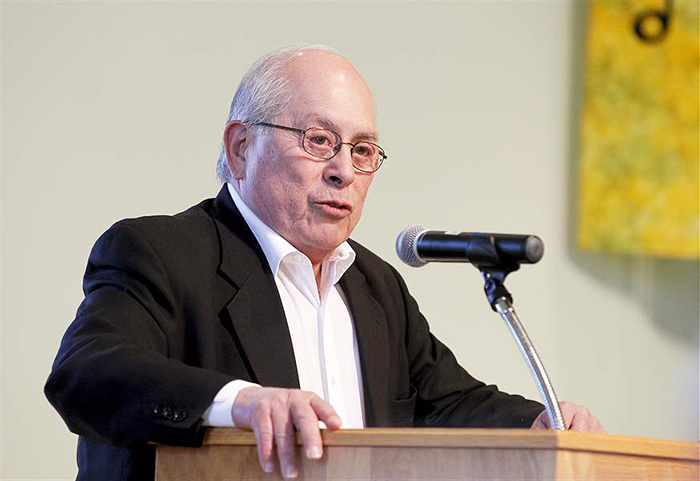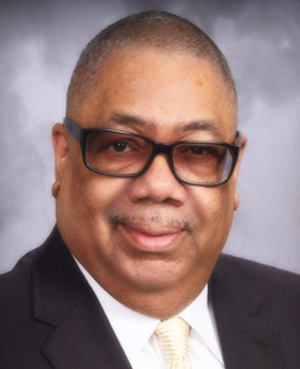
By Rev. Donald L. Perryman, Ph.D.
The Truth Contributor
The fight is never about grapes or lettuce. It is always about people. – César Chavez
The familiar refrain, “What you gonna do when they come for you?” once served as the backdrop to a television portrayal of justice. This representation of our justice system glorified law enforcement while casting Black, Brown and poor communities as threats or “Bad Boys” without dignity or due process.
But for millions of Black and Brown communities today, terrorized by the constant fear of the U.S. Customs and Immigration Enforcement agency’s (ICE) “snatch and grab” actions resulting from President Trump’s stepped-up immigration enforcement crackdown, this familiar warning has become a daily calculation.
Despite recent U.S. Supreme Court rulings that migrants are entitled to judicial review, President Donald Trump continues an escalating pressure campaign against judges and the U.S. court system, arguing that migrants should not receive due process before being deported.
As civil rights erode, for migrants and other immigrants, “Come for you” represents sudden disappearance, detention and deportation, possibly without having the right to a day in court.
Most powerfully, this haunting melody is a soundtrack to lives lived under a constant cloud of fear, where people must navigate an existence where going to work, dropping a child off at school or walking down the street is perilous.
I sat down with Baldemar Velásquez, founder of the Farm Labor Organizing Committee (FLOC), immigrant and worker rights champion, labor activist who was named a MacArthur Fellow (also known as the “Genius Grant”) in 1989, to talk about what hope and action must occur in such times.
Perryman: Someone has described you as “César Chavez of the Midwest.” You’ve organized farm labor communities for the last 30 years, fighting for immigrants’ and migrant workers’ rights throughout the country from North Carolina to Mexico.
You put together the Brown/Black coalition with the code of conduct being signed by police chiefs on how to approach people in the minority community. You’ve even been to England and have organized and advocated in Africa. We are honored to have such civil rights royalty right here in Toledo.
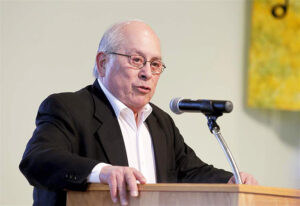
Velásquez: I advocated in the U.K. Parliament for a law against modern-day slavery because many European companies exploit workers abroad, especially in agriculture. That same exploitation exists here in the U.S., particularly in tobacco fields in North Carolina, Virginia, Kentucky, Tennessee and even Southern Ohio. European companies like British American Tobacco – owners of Reynolds America – buy these crops, linking global supply chains to local abuses.
Perryman: What took you to Africa?
Velásquez: I visited Malawi, Africa, through our union’s international network and witnessed conditions worse than those in North Carolina: workers, including children, earning just 85 cents daily. These global connections allow corporations to import cheap labor products into the U.S., undercutting American workers and worsening exploitation. We need sustainable trade agreements that promote fairness, not more greed. Profit shouldn’t come at the cost of human dignity.
So, for me, this work isn’t just a job – it’s a lifelong cause. If we believe in equality and equity and fairness and justice for all, we gotta do our best to live it.
Dr. Perryman: What was your ‘aha moment’ that shaped your understanding and told you this is what I really got to do?
Velásquez: It was watching my mom and my younger siblings’ mistreatment and the suffering out in those fields. I was very angry. Living in the squalor we were housed in, chicken coops and barns. You’re out picking crops in those rows, and you think that the only thing in life is when you’re done with this row, but then there’s another one just like it waiting for you. This institution, hopelessness, watching my mom and my dad being taken advantage of. The poverty was one thing, but what really hurt was the treatment of my parents and their younger siblings. It’s something that a young man can hardly stand, especially when they cuss at your mom and things like that and call her dirty names. You wanna hit somebody, you grow up angry, and that was me.
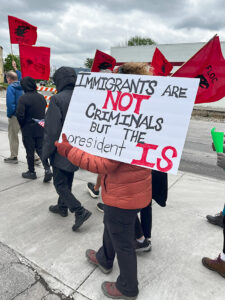 Perryman: When did life begin to click for you?
Perryman: When did life begin to click for you?
Velásquez: What clicked apart from my early experiences was that I planned to join the Marines after high school. However, a teacher encouraged me to consider college — something I hadn’t thought was possible for someone like me. While studying engineering at Pan American College, the mistreatment of my grandparents and the Civil Rights Movement shifted my focus toward justice. During a volunteer project documenting police brutality in Cleveland, an elder asked why I wasn’t fighting for my own people after I casually mentioned growing up so poor, we made games out of playing with rats. That challenge stuck with me, and when I returned home, I began organizing migrant farmworkers with the quiet but powerful support of my mother’s network of farmworker women. Those were my first FLOC meetings in Putnam County.
Perryman: Today, we see intensified immigration enforcement and deportation without due process. How do these trending forces connect to the struggles farmworkers and immigrant communities have always faced?
Velásquez: We’re moving at a high moment of tension around these issues that have persisted over the years. Now, we’re becoming the scapegoats or a distraction to the broader things this current administration is trying to achieve.
People are being abducted without a hearing, access to a judge or an attorney, and there are [many] individuals who have been sent to that prison down in El Salvador. It’s not a prison; it’s a concentration camp where people are held without charges, without the right to communicate with an attorney.
Can you imagine people coming into our community and just picking people up and saying, “We’ll deal with it later,” without a hearing or anything? That is a serious threat. I don’t know how they’re getting away with it. Can you imagine our fate if you and I just snubbed our noses at the law and the Constitution? It’s beyond comprehension, so we have to do everything we can to protect our people, have a good rapport with local law enforcement, and let them enforce local laws, not federal immigration laws.
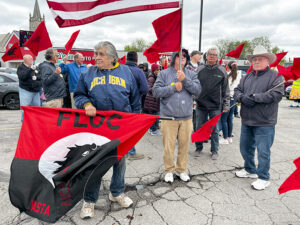 Perryman: Are there other things that should be done?
Perryman: Are there other things that should be done?
Velásquez: The second thing is to convince local law enforcement to hold ICE and border patrol accountable for due process. They’ve gotta have warrants with names on them. Otherwise, we’re instructing our people: you don’t have to talk to them, so walk away. If they detain you, they must have a reason to detain you. That’s an essential piece on which we train our people on their rights.
The next thing we’ve got to do is propose a solution, and the only solution is to reform the immigration laws. So, we’re calling for a new amnesty modeled after the amnesty of ’86 under President Ronald Reagan. Ronald Reagan was no friend of people with low incomes or the labor unions, but he did engineer that amnesty for some very practical reasons, and we’re using his language.
Perryman: What is the essence of Reagan’s amnesty model?
Velásquez: Number one, he said we need to legalize the workers here, whose only violation is being present without authorization. Almost 40 years ago now, Reagan saw the trend in our population growth and that it was skimming away the workforce needed in the future. We’re hitting that point now where many baby boomers have retired, and as people retire, we don’t have the birth rate in this country to fill the jobs that America will need. So, we need these immigrants here to keep the economy going and the United States’ ability to produce its own products and grow its own food. If not, we must rely on imports, which are a security threat.
Secondly, we demand sustainable trade agreements because today’s deals are written by and for Wall Street, protecting corporate investments while displacing millions. Agreements like NAFTA under Clinton and USMCA under Trump were never about helping workers; they let corporations chase cheap labor across borders, devastating farmers and workers in Mexico and Central America and forcing families to migrate to survive. The border crisis is not the cause — it’s the symptom of a system that trades human lives for profit margins, that props up oppressive regimes while crushing people’s ability to earn a fair living. If we ever want real immigration reform, we must confront the root injustice: trade and foreign policies that put Wall Street first and humanity last. That’s why we’re marching on May 3rd — to start a national conversation about building a system that stops displacing people in the first place.
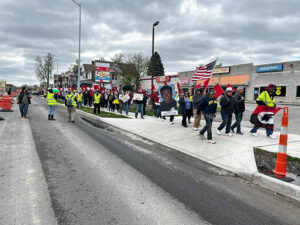 Perryman: What is some practical counsel for immigrant individuals, workers or young activists to manage living with the constant fear of separation and deportation?
Perryman: What is some practical counsel for immigrant individuals, workers or young activists to manage living with the constant fear of separation and deportation?
Velásquez: We tell them to be proactive; join a group and get organized. Don’t just sit there and be scared; get up and do something.
Number one, know your rights about people detaining you. Do they have a court order? Do they have a warrant with a name on it signed by a judge? Don’t allow ICE to come into your house unless they have a warrant with a name on it, and if the person with the name is on the warrant, then produce the person, let them go peacefully and do not resist or run. However, ICE has no right to come into your house and pick up everybody else that’s in there.
Perryman: Is there any other practical advice for migrants or immigrants?
Velásquez: On top of that, have a family plan in case of a legitimate deportation order, and have your things in place. Include a Power of Attorney and a plan listing who will take care of your kids and property in case of deportation.
Perryman: Labor and movement struggles are often disconnected, becoming siloed and therefore ineffective. How do you keep that from happening in Toledo?
Velásquez: We must make ourselves visibly available to other groups and people without them feeling that we’re a threat. This is what we’re trying to do with the Black/Brown Unity Coalition. We’re not going to agree on everything, but there are some common things in our communities that we can agree on, and then we decide that those are the things we work on together.
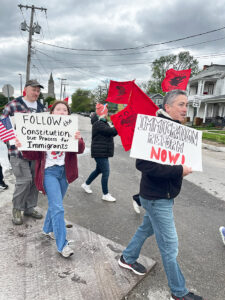 That’s how this code of conduct came together with the NAACP, Ray Wood, the Toledo Community Coalition, the Coalition of Black Trade Unionists, Latins United and, of course, FLOC. We brought these groups together, discussed this code of conduct, and agreed that it would benefit all of our communities. We worked together and we succeeded.
That’s how this code of conduct came together with the NAACP, Ray Wood, the Toledo Community Coalition, the Coalition of Black Trade Unionists, Latins United and, of course, FLOC. We brought these groups together, discussed this code of conduct, and agreed that it would benefit all of our communities. We worked together and we succeeded.
Perryman: Finally, amid the trauma of current mass deportation, lack of due process, and erosion of Civil Rights, what are the signs you see that the seeds you and others planted are still growing and give you hope?
Velásquez: What gives me hope is seeing real responses to our efforts, like support of immigration reform and the county commissioners’ endorsement of the Law Enforcement Code of Conduct. We’re working to extend these protections countywide and into places like North Carolina and Virginia, where many immigrants and FLOC members live without formal IDs.
For the Black community, the code offers an alternative to ineffective internal affairs investigations, creating a transparent process where community meetings can hold law enforcement accountable. It’s about building trust, not deepening mistrust, and continuing the work of justice we planted years ago.
Contact Rev. Donald Perryman, PhD, at drdlperryman@enterofhopebaptist.org

